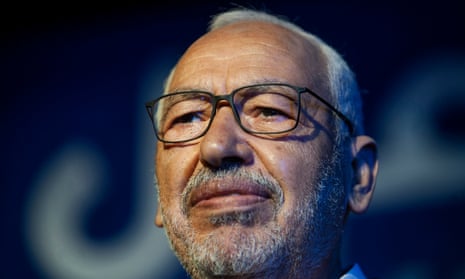 The leader of the moderate Islamist party Ennahdha, Rached Ghannouchi, was arrested in April. Photograph: Hassene Dridi/AP
The leader of the moderate Islamist party Ennahdha, Rached Ghannouchi, was arrested in April. Photograph: Hassene Dridi/APThe president, Kais Saied, has turned our country into a dictatorship, while Europe looks the other way
THE GUARDIAN
OPINION
Tue 30 May 2023
“Historic” – that is how Tunisia’s president, Kais Saied, described his meeting with Syria’s Bashar al-Assad on the eve of the Arab League summit in Jeddah earlier this month. Snaps of him standing alongside al-Assad and Egypt’s Abdel Fatah al-Sisi during the summit were widely shared around the region, signalling Tunisia’s return to the grand old club of Arab dictatorships.
For all their internecine conflicts and rivalries, hidden and visible, Arab leaders are again united around one sacred goal: aborting their people’s aspirations for change. Muammar Gaddafi, Hosni Mubarak and Zine al-Abidine Ben Ali may no longer be on the stage, but their spirit lives on in a new generation.
But let us focus on Tunisia – once seen as the last democratic hope of the Arab world. Since the era of the Arab spring, which in Tunisia saw Ben Ali deposed, the country has resisted the dark fates of its sisters such as Egypt, Yemen, Libya or Syria. Democratisation seemed to be in train. But no longer – as the experience of my 81-year-old father, Rached Ghannouchi, attests.
My father, the leader of the moderate Islamist party Ennahdha and the former elected speaker of Tunisia’s parliament, was arrested in April, as the family prepared to break its fast at the end of Ramadan. About 100 security officers raided our home. My sister says my father was taken to a military barrack, where he spent almost 48 hours, waiting to be allowed access to his lawyers, before he was charged with “conspiring against state security”.
The reason – I should say, pretext – are the following comments he made: “There is a paralysis, intellectual and ideological, which, in reality, lays the ground for civil war. Because imagining Tunisia without this or that side, Tunisia without Ennahdha, Tunisia without political Islam, without the Left, without any of its components, is a civil war project. It is a crime. That is why those who welcomed this coup with celebrations cannot be democrats.”
The ludicrous charge against him carries the possibility of the death penalty.
How did we get here? In the years after the revolution, Tunisia managed to adopt a consensual progressive constitution and lay down the foundations for local governance. It was on the verge of completing its democratic transition, ready to focus on confronting its mighty socioeconomic challenges, having devoted much of its energy to political rebuilding.
Then it was dismantled from within. Kais Saied, a relatively unknown assistant university lecturer, was in 2019 voted president, using pro-revolutionary and ultra-conservative rhetoric. But as soon as he set foot in the presidential Carthage palace, he pulled up the democratic ladder upon which he had climbed to power. In 2021, he barricaded parliament with military vehicles and started running the country through presidential decrees, before dissolving the legislature in 2022. He moved to overthrow the constitution, writing his own instead, which was passed after a referendum with a 30% turnout, giving him immense power over his subjects’ bodies and souls.
After his de facto coup, Saied directed his firepower at two targets: judges and the security services. He dissolved the independent Supreme Judicial Council, appointing his own, and dismissed 57 judges by a single presidential decree, accusing them of corruption.
Saied also restored Ben Ali’s old legacy in the security apparatus, reversing post-revolution reforms aimed at curbing police brutality. This is how he prepared the ground for the current crackdown against dissidents. The targets include not only political leaders of all tendencies, but civil society activists, journalists, solicitors, even people simply writing critical Facebook posts.
Opponents are called everything from “enemies” to “cancer cells”. The list grows by the day, from “agents of foreign powers” to vulnerable African migrants accused of being part of a conspiracy to change the country’s demography, echoing the far-right “great replacement” theory.
Tunisia has turned from a fragile democracy into a country resembling a full-fledged dictatorship. It is a cocktail of failures, robbed of its hard-won freedoms, and thrust into a deep economic crisis. People stand in long queues every day, hoping to get bread, some sugar, flour or oil.
This all unfolds in full sight of Europe, whose major capitals look the other way, confining themselves to the odd statement of concern, which are openly mocked by Tunisia’s despot, who retorts: “I, too, am concerned by your concern!” As tanks blocked parliament, destroying Tunisia’s nascent democracy, these countries would not even call what was happening a coup.
As my father, who has dedicated his life to reconciling Islam with democracy, in word and action, finds himself behind bars today, the message to the people of the region is loud and clear: democracy is not for them, and anyone who thinks otherwise is a naive idealist. But if change through peaceful means is not attainable, what is the way out of this Arab abyss?
Tue 30 May 2023
“Historic” – that is how Tunisia’s president, Kais Saied, described his meeting with Syria’s Bashar al-Assad on the eve of the Arab League summit in Jeddah earlier this month. Snaps of him standing alongside al-Assad and Egypt’s Abdel Fatah al-Sisi during the summit were widely shared around the region, signalling Tunisia’s return to the grand old club of Arab dictatorships.
For all their internecine conflicts and rivalries, hidden and visible, Arab leaders are again united around one sacred goal: aborting their people’s aspirations for change. Muammar Gaddafi, Hosni Mubarak and Zine al-Abidine Ben Ali may no longer be on the stage, but their spirit lives on in a new generation.
But let us focus on Tunisia – once seen as the last democratic hope of the Arab world. Since the era of the Arab spring, which in Tunisia saw Ben Ali deposed, the country has resisted the dark fates of its sisters such as Egypt, Yemen, Libya or Syria. Democratisation seemed to be in train. But no longer – as the experience of my 81-year-old father, Rached Ghannouchi, attests.
My father, the leader of the moderate Islamist party Ennahdha and the former elected speaker of Tunisia’s parliament, was arrested in April, as the family prepared to break its fast at the end of Ramadan. About 100 security officers raided our home. My sister says my father was taken to a military barrack, where he spent almost 48 hours, waiting to be allowed access to his lawyers, before he was charged with “conspiring against state security”.
The reason – I should say, pretext – are the following comments he made: “There is a paralysis, intellectual and ideological, which, in reality, lays the ground for civil war. Because imagining Tunisia without this or that side, Tunisia without Ennahdha, Tunisia without political Islam, without the Left, without any of its components, is a civil war project. It is a crime. That is why those who welcomed this coup with celebrations cannot be democrats.”
The ludicrous charge against him carries the possibility of the death penalty.
How did we get here? In the years after the revolution, Tunisia managed to adopt a consensual progressive constitution and lay down the foundations for local governance. It was on the verge of completing its democratic transition, ready to focus on confronting its mighty socioeconomic challenges, having devoted much of its energy to political rebuilding.
Then it was dismantled from within. Kais Saied, a relatively unknown assistant university lecturer, was in 2019 voted president, using pro-revolutionary and ultra-conservative rhetoric. But as soon as he set foot in the presidential Carthage palace, he pulled up the democratic ladder upon which he had climbed to power. In 2021, he barricaded parliament with military vehicles and started running the country through presidential decrees, before dissolving the legislature in 2022. He moved to overthrow the constitution, writing his own instead, which was passed after a referendum with a 30% turnout, giving him immense power over his subjects’ bodies and souls.
After his de facto coup, Saied directed his firepower at two targets: judges and the security services. He dissolved the independent Supreme Judicial Council, appointing his own, and dismissed 57 judges by a single presidential decree, accusing them of corruption.
Saied also restored Ben Ali’s old legacy in the security apparatus, reversing post-revolution reforms aimed at curbing police brutality. This is how he prepared the ground for the current crackdown against dissidents. The targets include not only political leaders of all tendencies, but civil society activists, journalists, solicitors, even people simply writing critical Facebook posts.
Opponents are called everything from “enemies” to “cancer cells”. The list grows by the day, from “agents of foreign powers” to vulnerable African migrants accused of being part of a conspiracy to change the country’s demography, echoing the far-right “great replacement” theory.
Tunisia has turned from a fragile democracy into a country resembling a full-fledged dictatorship. It is a cocktail of failures, robbed of its hard-won freedoms, and thrust into a deep economic crisis. People stand in long queues every day, hoping to get bread, some sugar, flour or oil.
This all unfolds in full sight of Europe, whose major capitals look the other way, confining themselves to the odd statement of concern, which are openly mocked by Tunisia’s despot, who retorts: “I, too, am concerned by your concern!” As tanks blocked parliament, destroying Tunisia’s nascent democracy, these countries would not even call what was happening a coup.
As my father, who has dedicated his life to reconciling Islam with democracy, in word and action, finds himself behind bars today, the message to the people of the region is loud and clear: democracy is not for them, and anyone who thinks otherwise is a naive idealist. But if change through peaceful means is not attainable, what is the way out of this Arab abyss?

Soumaya Ghannoushi is a British-Tunisian writer and researcher specialising in the Middle East and north Africa
No comments:
Post a Comment